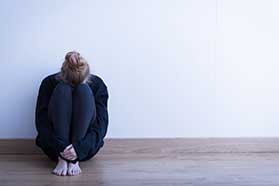Bipolar Disorder

Bipolar disorder is a mental health condition that causes changes in mood and affects the ability to function from day to day. People with bipolar disorder are often referred to as manic-depressive.
The symptoms of bipolar disorder are more severe than the regular up and down emotions most people have. These swings in mood and function can cause sufferers to lose their jobs, relationships with friends or family, and may even drive some to commit suicide.
According to the National Institute of Mental Health, bipolar disorder usually develops in the late teens to early adult years, and half of all cases start before the age of 25. Thankfully, many people with bipolar disorder can be treated and go on to lead normal, healthy lives.
To learn more about bipolar disorder, please call (919) 803-6320 or contact us online.
Symptoms of Bipolar Disorder
People with bipolar disorder experience mood states—where they swing to one intense emotional state and then to another. An overly happy, excited state is called a “manic” episode. An extremely sad, hopeless state is a “depressive” episode.
Men and women with bipolar disorder can also experience both at the same time. This is known as a “mixed state”.
Manic state symptoms may include:
- Being overly happy or excited
- Talking very fast
- Jumping from idea to idea
- Restlessness
- Taking on new projects
- Easily distracted
- Having an unrealistic belief in their abilities
- Impulsive, risk-taking behaviors
Depressive state symptoms may include:
- Loss of interest in activities or behaviors they once enjoyed
- Feeling tired or slow
- Trouble concentrating, remembering or making decisions
- Feeling irritable or restless
- Changes in eating or sleeping habits
- Thoughts of suicide or attempted suicide
Types of Bipolar Disorder
According to the fifth edition of the Diagnostic and Statistical Manual of Mental of Mental Disorders (DSM-5), there exist four types of bipolar disorder:
- Bipolar I disorder: Bipolar I patients experience manic and depressive episodes. At least one manic episode is needed to confirm bipolar I, as are episodes that last over 7 days or require hospitalization. Bipolar I may or may not present with a depressive state.
- Bipolar II disorder: Patients with bipolar II cycle between depression and hypomania, never reaching full mania.
- Cyclothymic disorder: Patients experience a episodes of hypomania and mild depression. Euthymic states (normal moods) may appear, but do not last beyond 2 months.
- Other specified bipolar and related disorder: Replacing bipolar disorder not otherwise specified, this is diagnosed if episodes of mania and depression are severe, but don’t fit the time limits of other bipolar disorders.
Causes of Bipolar Disorder
There is no one known cause of bipolar disorder. Some researchers believe that genetics and brain development play key roles.
Bipolar Disorder Treatment
Bipolar disorder can worsen without treatment and can have a serious negative impact on work, school and personal relationships. Treatment is a long-term process that focuses on reducing mood cycles and other related symptoms.
Bipolar disorder treatment options include:
Medications
- Mood stabilizers like lithium have been used since the 1970’s. Anticonvulsants may also be used. All of these drugs carry side effects and health risks that should be discussed before starting the regimen.
- Antipsychotic drugs may be used in conjunction with anti-depressants to control episodes of mania.
- Antidepressants can control bouts of depression but should be taken with an antipsychotic or mood stabilizer to reduce the risk of developing mania.
Psychotherapy
Psychotherapy done in a one-on-one, family, or group setting has shown great benefit for bipolar disorder sufferers. In studies, patients who had intensive psychotherapy had fewer relapses and were able to follow their treatment plan more closely than those who did not.
Electroconvulsive Therapy (ECT)
For patients who do not respond to therapy and medications, electroconvulsive therapy may be an option. Called “shock therapy” in the past, the practice has evolved far beyond its bad name into an effective treatment for many men and women with bipolar disorder.
Outside Support
The difficulties of bipolar disorder affect many people in a sufferer’s life. If you are close to someone with bipolar disorder, do your best to support them with patience and encouragement. Try to learn what you can about the condition, and remind your friend or loved one that they can get better even when it seems difficult.
Request More Information
To request more information about Bipolar Disorder treatment options, please call (919) 803-6320 or contact us online.
